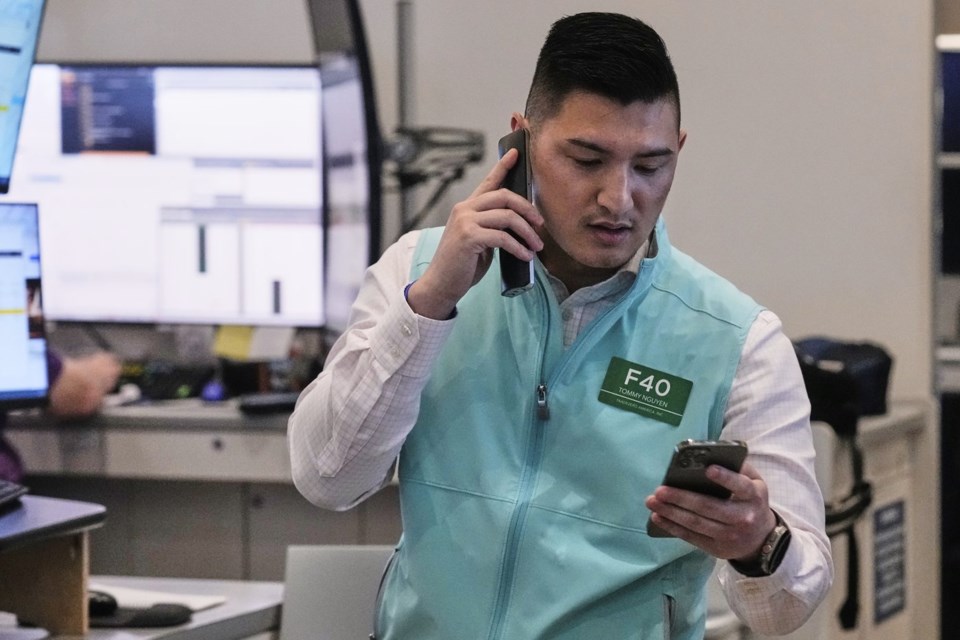NEW YORK (AP) — Stocks are opening lower on Wall Street after a big jump last week on hopes for more interest rate cuts from the Federal Reserve. The S&P 500 slipped 0.2% in the first few minutes of trading Monday. The Dow Jones Industrial Average fell 72 points, or 0.2%, and the Nasdaq composite was down 0.3%. Keurig Dr Pepper sank 7.7% after saying it will buy Peet’s Coffee owner JDE Peet’s in a deal worth about $18 billion. Treasury yields rose in the bond market. European markets were mixed and Asian markets closed lower overnight.
THIS IS A BREAKING NEWS UPDATE. AP’s earlier story follows below.
BANGKOK (AP) — World shares were mixed on Monday after the head of the Federal Reserve hinted that cuts to interest rates may be on the way.
European markets opened lower, with Germany's DAX down 0.2% at 24,305.67, while the CAC 40 in Paris lost 0.6% to 7,918.34. Britain's markets were closed for a holiday.
The futures for the S&P 500 and the Dow Jones Industrial Average were down 0.2%.
On Friday, stocks on Wall Street rallied after Fed chair Jerome Powell said in a speech to an annual conference in Jackson Hole, Wyoming, that he's seen risks for the job market. That followed a surprisingly weak report on job growth this month that has led many traders to expect a rate cut as soon as the Fed's next meeting in September, after months of pressure from President Donald Trump for lower rates.
Lower interest rates make borrowing easier, helping to spur more investment and spending, but also potentially fueling inflation.
In Asian trading, shares advanced.
Hong Kong's Hang Seng index closed 1.9% higher at 25,829.91, while the Shanghai Composite index surged 1.5% to 3,883.56. It has been trading at its highest level in a decade, despite worries over higher tariffs on exports to the United States under Trump and weak domestic demand at home.
Taiwan's Taiex gained 2.2% as semiconductor maker TSMC Corp.'s shares advanced 3.1%.
Tokyo's Nikkei 225 gained 0.4% to 42,807.82, with computer chip-related companies leading gains.
The Kospi in South Korea climbed 1.3% to 3,209.86.
Australia's S&P/ASX 200 edged less than 0.1% higher, to 8,972.40.
The SET in Bangkok gained 0.7%, while the Sensex in India rose 0.5%.
This week, Nvidia's earnings report, due Wednesday after markets on Wall Street close, is a key focus of attention.
Nvidia's role as a key supplier of chips for artificial intelligence and its heavy weighting give it outsized influence as a bellwether for the broader market.
On Friday, the S&P 500 leaped 1.5% for its first gain in six days, while the Dow industrials soared 1.9%. The Nasdaq composite also jumped 1.9%.
Investors love lower interest rates, and stocks of smaller companies led gains. They can benefit more from lower interest rates because of their need to borrow money to grow. The smaller stocks in the Russell 2000 index surged 3.9% for its best day since April.
Still, Powell did not commit to any kind of timing. He said the job market looks OK, even if “it is a curious kind of balance” where fewer new workers are chasing after fewer new jobs. Inflation, meanwhile, still has the potential to push higher.
The yield on the 10-year Treasury fell to 4.25% from 4.33% late Thursday. The two-year Treasury yield, which more closely tracks expectations for Fed action, sank to 3.69% from 3.79% in a notable move for the bond market.
Intel climbed 5.5% after Trump said the chip company has agreed to give the U.S. government a 10% stake in its business.
Nvidia rose 1.7% to trim its loss for the week. The company, whose chips are powering much of the world’s move in to artificial-intelligence technology, had seen its stock struggle recently amid criticism that it and other AI superstars shot too high, too fast and became too expensive.
In other dealings early Monday, U.S. benchmark crude oil gained 50 cents to $64.16 per barrel. Brent crude, the international standard, added 45 cents to $67.67 per barrel.
The U.S. dollar rose to 147.34 Japanese yen from 146.88 yen. The euro fell to $1.1696 from $1.1727.
Elaine Kurtenbach, The Associated Press



